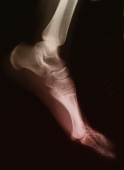
WEDNESDAY, Feb. 6 (HealthDay News) -- An advanced imaging study has captured the fact that amyloid plaques, the harbingers of Alzheimer's disease, can develop in just 24 hours.
"They form more rapidly than expected," said Dr. Bradley Hyman, leader of the group reporting the finding in the Feb. 7 issue of Nature. Once the plaques develop, damage is evident in nearby nerve cells almost immediately, he added.
"The study we've done, using an animal model of Alzheimer's disease, tried to sort out the order in which things occur," said Hyman, director of the Alzheimer's Unit at the Massachusetts General Hospital Institute for Neurodegenerative Disease. "We've had snapshots of individual steps in the past. This microscopic technology gives us the ability to watch the process from beginning to end, to see the variety of things that happen as inflammatory cells get activated."
The microscopic imaging, done first weekly and then daily, found that plaque formation was a relatively rare event. But plaques could be seen in some animals in as little as 24 hours after a plaque-free image was taken.
What happens in the animals, mice bred to develop amyloid plaques, almost certainly happens in the human brain, Hyman said, and the finding could be applied to humans at risk for developing Alzheimer's.
"Knowing that plaque occurs quickly implies that something initiates it," he said. "That is the next question to be answered."
The studies showed that nerve cell changes associated with Alzheimer's disease appear within days. The results confirm suspicions that plaque formation is a primary event in the abnormal cell activity that underlies Alzheimer's disease, Hyman said.
"Watching the pathology unfold in real time dynamically, that is an extremely exciting move forward," said Dr. Sam Gandy, chairman of the Alzheimer's Association medical and scientific advisory council. Gandy recently became associate director of the Alzheimer's Disease Research Center at Mount Sinai Medical Center in New York City.
The finding does have immediate relevance to the effort to develop treatments for Alzheimer's disease, Gandy said. "It reinforces the idea that anti-amyloid medication is a rational strategy," he said. "It reinforces the idea that attacking amyloid plaque helps nerve cells. You can see in nerve cells nearby changes in shape indicating that the cells are reacting to amyloid plaque, that is a link between those features of a pathology."
The study also answers a question about whether amyloid plaque can form only near blood vessels, Gandy said. "There have been reports that every amyloid plaque had a blood vessel somewhere," he explained. "That seems not to be the case."
But formation of amyloid plaque is not the only brain change associated with Alzheimer's disease, Hyman noted. Another notable feature consists of changes in the tau proteins that normally provide a scaffold for orderly function of nerve cells in the brain. Those tau proteins can become disordered, forming tangles that lead to destruction of nerve cells.
Studies of the formation of those tangles, using the same technology that led to the plaque discovery, are about to begin, Hyman said.
More information
Keep up to date on Alzheimer's disease by consulting the Alzheimer's Association  .
.

MONDAY, Feb. 4 (HealthDay News) -- President Bush's new budget proposal would cut $196 billion over five years from both Medicare and Medicaid -- programs that provide health care to millions of poor and elderly, federal officials announced Monday.
The proposed cuts are part of a plan to stop Medicare from running out of money in little more than a decade, Secretary of Health and Human Services (HHS) Mike Leavitt told reporters during a press conference. He said the savings would help keep premiums affordable, maintain the Medicare/Medicaid system, and balance the current Medicare budget.
"The Medicare portion of the budget should be viewed as a stark warning," Leavitt said. "Medicare on its current course is 11 years from going broke. Americans have become numbed to entitlement warnings as a repeated cycle of alarms and inaction," he said.
But President Bush and Leavitt are sure to face a Congressional showdown over the budget proposals.
"This administration ought to know that five years' worth of Medicare and Medicaid cuts totaling $200 billion are dead on arrival with me and with most of the Congress," Sen. Max Baucus, D-Mont., and chairman of the Senate Finance Committee, told the Associated Press.
Not every agency would lose funds in the new budget: The cash-strapped U.S. Food and Drug Administration would receive a nearly 6 percent boost in financing, much of which would go to programs that oversee food safety, agency officials said.
All of these announcements stem from the $3.1 trillion 2009 budget proposal announced by the Bush administration Monday.
According to Leavitt, the majority of the Medicare cuts would come from reductions to fees paid to hospitals, nursing homes and hospices.
Medicare makes up 56 percent of the $737 billion HHS budget, Leavitt said. Cuts in the Medicare budget will become the norm until Medicare itself changes, he said. "We can keep our national commitment, but to do this we need to change our management of Medicare," Leavitt said.
Under the president's plan, the annual growth of Medicare spending would slow to 5 percent instead of the 7 percent currently projected. Similarly, spending growth would slow from 7.3 percent to 7 percent for Medicaid.
Medicare is an inefficient system and needs to be changed, Leavitt charged. Changing the system means putting more responsibility into the hands of consumers, enabling them to make their own health-care decisions, he said.
"If consumers were allowed to make the decisions in an efficient market, through electronic medical records, through quality measures, through cost comparisons and choices and incentives, their decisions would be far more precise and wise," he said. "It would produce better health, and at a lower cost."
But at least one critic believes a shrinking Medicare budget would hurt consumers and the health-care system.
"President Bush's proposed cuts to Medicare would hurt older and disabled Americans and take a wrecking ball to many essential hospitals across the country," Robert M. Hayes, president of the Medicare Rights Center, said in a prepared statement. "It is indefensible for the President to propose hurting America's grandparents while maintaining his rabid defense of Medicare overpayments to for-profit health insurance companies."
Under the Bush proposed budget, the U.S. Food and Drug Administration would receive an additional $130 million added for fiscal year 2009, which begins Oct. 1.
"The agency's 2009 budget includes $2.4 billion, which includes direct budget authority and user fees," John Dyer, FDA's deputy commissioner for operations and chief operating officer, said during a Monday afternoon teleconference. "That's a 5.7 percent increase over the 2008 budget just passed by Congress."
According to Dyer, the budget would increase resources spent on food safety, modernize drug safety, speed approval of generic drugs and improve the safety and review of medical devices. The budget also includes increases in salaries and up to 1,000 additional employees for the FDA.
The agency, which was shaken by a long list of food recalls and food-linked illness outbreaks in 2007, plans to boost its inspections of domestic and imported food, as well as medical products. It will also target more inspections of high-risk food items, Dyer said.
An industry group applauded the agency's new emphasis on bringing cheaper generic drugs to the public faster.
"Bringing generic medicines to market in a timely manner is a win-win for the federal government, the generic industry and, most of all, consumers," Generic Pharmaceutical Association President and CEO Kathleen Jaeger said in a prepared statement.
Other agencies within HHS would either receive no added funding or lose money under the Bush budget proposal. These include the National Institutes of Health, which would see its budget hold steady at $29.4 billion for next year, and the Centers for Disease Control and Prevention, which would have $400 million shaved off its current budget of $6.2 billion. Programs aimed at providing health care to the rural poor would see their budgets fall from $6.9 billion to $6.0 billion, the president's office announced.
In addition to these other agencies, U.S. Environmental Protection Agency is looking at a $7.14 billion budget proposal for 2009. The agency hopes to use its money to strengthen energy and homeland security around cities and major ports.
The EPA would also continue to promote energy efficiency and clean air and water standards. The agency intends to use $170 million to fund emergency teams that can address more than one terrorist attack at a time, the agency said in a statement. In addition, the EPA is looking for a total of $563 million for criminal enforcement.
More information
For more on Medicare, visit the U.S. Department of Health and Human Services.

SUNDAY, Feb. 3 (HealthDay News) -- In the United States, about one in three seniors over age 65, and almost one in two over age 80, will fall at least once this year -- in some cases, leading to serious disability or even death.
But ways for seniors to improve their balance and reduce their risk of falls are expected to be discussed on an American Physical Therapy Association-sponsored national toll-free hotline on Friday, Feb. 8, from 9 a.m. to 5 p.m.
Physical therapists will answer questions about risk factors for falling, how the body maintains its balance, and how older adults can improve their balance and reduce their risk of falling. The hotline number is 1-877-633-3278.
There are a number of fall risk factors, including: being older; being female; problems with balance or walking; leg or trunk weakness; dementia; a past history of falls; use of a walking device; being on more than four medications at the same time; and preexisting medical conditions such as stroke, diabetes and Parkinson's disease.
Staying physically active as you age is critical in helping prevent falls, said Roberta Newton, a professor in the physical therapy department at Temple University in Philadelphia.
"Fifty percent of older adults think that if they decrease their physical activity level, they will have less chance of falling. But, in reality, the exact opposite is true," Newton said in a prepared statement.
Gardening, line dancing and yoga are among the activities that can help older adults improve balance and movement.
"We see significant improvement not only in patients' balance, but also with their confidence levels, an awareness of body alignment, and a reduced fear of falling," Newton said.
More information
The U.S. National Institute on Aging has more about older adults and falls.